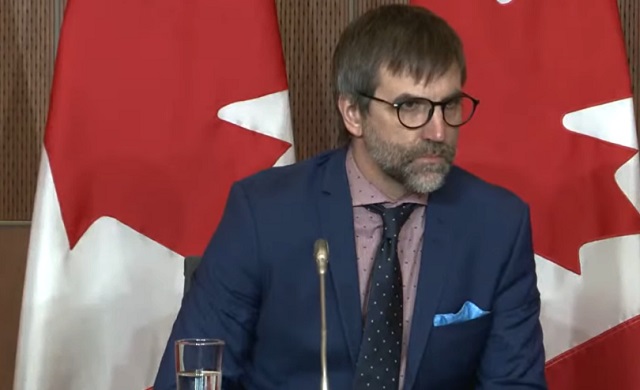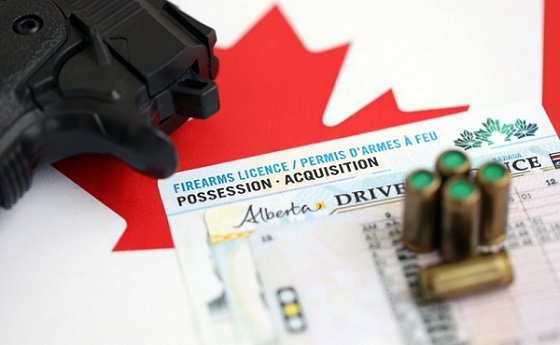National
Trudeau’s environment minister proclaims himself ‘proud socialist’ before House of Commons

From LifeSiteNews
Steven Guilbeault made the declaration during a debate about the impact of carbon tax policies on soaring energy bills
Minister of Environment Steven Guilbeault proudly proclaimed before the House of Commons on Tuesday that he is a “proud socialist” during a debate over a carbon tax the federal government has imposed on Canadians that has contributed to sky-high energy bills.
“I’m a Liberal and a proud socialist,” Guilbeault said after being asked a question by Conservative Party of Canada (CPC) MP Ted Falk concerning the carbon tax.
Guilbeault then blamed former conservative Prime Minister Stephen Harper for not “believing” in “climate change” as a reason the current conservatives do not support a carbon tax.
“This reminds me of a certain quote from Prime Minister Harper who talked about the fight against climate change as a socialist plot,” he said.
“Here it is, you have it again, Mr. Speaker. They do not believe that climate change is an issue. They do not believe we should do anything about it.”
Where did he say this? I would love to share the clip.
— Nicholas Grillo🍎🍎 (@nicholas_grillo) November 7, 2023
Falk had said to Guilbeault before his “socialist” response that Prime Minister Justin Trudeau has created a “carbon tax” coalition with other socialist and separatist entities in Canada to cause financial pain for Canadians.
“After eight years, we now have the socialists, the separatists, and this prime minister who’s just not worth the cost,” Falk said.
“They’re all part of this costly carbon tax coalition that is leaving Canadians out in the cold.”
Trudeau has many times before blamed Harper for his government’s ills, it should be noted.
Reaction to Guilbeault’s comments came swiftly from many Canadian political pundits and others.
“Steven Guilbeault isn’t just a ‘proud socialist,’ he’s a total nutbar, climate extremist and incompetent minister,” wrote Paul Mitchell, a former People’s Party of Canada candidate and political commentator on X (formerly Twitter).
“Every provincial premier should demand that Guilbeault be sacked. Dealing with him is intolerable.”
Jim Murphy, a retired Toronto police officer, wrote on X, “I’m a bit confused, shouldn’t @s_guilbeaultbe a member of the NDP and not the @liberal_party? Serious question.”
The carbon tax has been a hot topic in the House of Commons, notably after Trudeau announced about two weeks ago he was pausing the collection of the carbon tax on home heating oil for three years but only for Atlantic Canadian provinces. The current cost of the carbon tax on home heating fuel is 17 cents per liter. Most Canadians, however, heat their homes with clean-burning natural gas, which will not be exempted from the carbon tax.
Trudeau’s carbon tax pause for Atlantic Canada announcement came amid dismal polling numbers showing his government is likely to be defeated in a landslide by the Conservative Party in the next election.
As a result, the CPC under leader Pierre Poilievre introduced a motion calling for the carbon tax to be paused for all Canadians. This motion was voted down on Monday by the Liberals with support from the Bloc Quebecois.
The New Democratic Party (NDP) voted in support of the CPC motion, despite the fact they have an informal coalition with the party that began last year, agreeing to support and keep the Liberals in power until the next election is mandated by law in 2025.
As for Guilbeault, he is perhaps Trudeau’s most radical minister in terms of his extreme environmental views. He recently said the Liberal government was going to push ahead with net-zero emission regulations despite the fact Canada’s Supreme Court recently ruled against the federal government’s “no more pipelines” legislation.
Earlier this year, the CPC slammed Trudeau for having Guilbeault accept an invite from China for climate talks.
Alberta Premier Danielle Smith has been a staunch opponent of Trudeau’s net-zero regulations and praised the court decision as returning power to the provinces.
Guilbeault has a history of environmental activism. In 2001, he was arrested after scaling the CN Tower in Toronto as part of a stunt for Greenpeace.
The CPC has previously called out extreme views emanating from the Liberal Party.
In September, Poilievre called Trudeau and his father Pierre Elliot Trudeau “Marxists” when asked by an Ontario resident what could be done to help prevent Canada from going “down” due to Liberal policies.
LifeSiteNews reported last month how Trudeau’s carbon tax is costing Canadians hundreds of dollars annually, as the rebates given out by the federal government are not enough to compensate for the increased fuel costs.
The Trudeau government’s current environmental goals – in lockstep with the United Nations’ “2030 Agenda for Sustainable Development” – include phasing out coal-fired power plants, reducing fertilizer usage, and curbing natural gas use over the coming decades.
The reduction and eventual elimination of the use of so-called “fossil fuels” and a transition to unreliable “green” energy has also been pushed by the World Economic Forum (WEF) – the globalist group behind the socialist “Great Reset” agenda – an organization in which Trudeau and some of his cabinet are involved.
International
Trump admin wants to help Canadian woman rethink euthanasia, Glenn Beck says

From LifeSiteNews
Jolene Van Alstine, approved for state-sanctioned euthanasia after enduring long wait times to receive care for a rare parathyroid disease, is in need of a passport to enter the U.S.
Well-known American media personality Glenn Beck says he has been in touch with the U.S. State Department to help a Canadian woman in Saskatchewan reconsider euthanasia after she sought assisted suicide due to long medical wait times to address her health problems.
As reported by LifeSiteNews on Tuesday, Canadian woman Jolene Van Alstine was approved to die by state-sanctioned euthanasia because she has had to endure long wait times to get what she considers to be proper care for a rare parathyroid disease.
Van Alstine’s condition, normocalcemic primary hyperparathyroidism (nPHPT), causes her to experience vomiting, nausea, and bone pain.
Her cause caught the attention of Beck and many other prominent Americans and Canadians on X.
In an update today on X, Beck said, “Jolene does not have a passport to gain legal entry into the U.S., but my team has been in touch with President (Donald) Trump’s State Department.”
“All I can say for now is they are aware of the urgent life-saving need, and we had a very positive call,” he added.
Beck had said before that he was in “contact with Jolene and her husband” and that he had “surgeons who emailed us standing by to help her.”
As of press time, neither the State Department nor other officials have not yet confirmed Beck’s claim that he has been in touch with them.
As a result of Van Alstine’s frustrations with the healthcare system, she applied for Canada’s Medical Assistance in Dying (MAiD) and was approved for January 7.
As reported by LifeSiteNews, over 23,000 Canadians have died while on wait lists for medical care as Prime Minister Mark Carney’s Liberal government is focused on euthanasia expansions.
A new Euthanasia Prevention Coalition report revealed that Canada has euthanized 90,000 people since 2016, the year it was legalized.
As reported by LifeSiteNews recently, a Conservative MP’s private member’s bill that, if passed, would ban euthanasia for people with mental illness received the full support of the Euthanasia Prevention Coalition.
Censorship Industrial Complex
Conservative MP calls on religious leaders to oppose Liberal plan to criminalize quoting Scripture

From LifeSiteNews
Quoting the Bible, Quran, or Torah to condemn abortion, homosexuality, or LGBT propaganda could be considered criminal activity
Conservatives are warning that Canadians should be “very afraid” of the Liberals’ proposal to punish quoting Scripture, while advising religious leaders to voice their opposition to the legislation.
During a December 6 session in Parliament, Conservative Member of Parliament (MP) Larry Brock warned Canadians of the very real threat to their religious freedom thanks to proposed amendments to Bill C-9, the “Combating Hate Act,” that would allow priests quoting Scripture to be punished.
“Do Christians need to be concerned about this legislation?” MP Bob Zimmer questioned. “Does it really threaten the Bible and free speech in Canada?”
“They should be very afraid,” Brock responded. “Every faith leader should be very afraid as to what this Liberal government with the support of the Bloc Quebecois wishes to do.”
“As I indicated, religious freedom is under attack at the hands of this Liberal government,” he declared.
Brock stressed the need for religious leaders to “speak out loud and clear” against the proposed amendment and contact their local Liberal and Bloc MPs.
Already, the Canadian Conference of Catholic Bishops penned an open letter to the Carney Liberals, condemning the proposed amendment and calling for its removal.
As LifeSiteNews reported earlier this week, inside government sources revealed that Liberals agreed to remove religious exemptions from Canada’s hate speech laws as part of a deal with the Bloc Québécois to keep Liberals in power.
Bill C-9, as reported by LifeSiteNews, has been blasted by constitutional experts as empowering police and the government to go after those it deems to have violated a person’s “feelings” in a “hateful” way.
Now, the Bloc amendment seeks to further restrict free speech. The amendment would remove the “religious exemption” defense, which has historically protected individuals from conviction for willful promotion of hatred if the statements were made “in good faith” and based on a “religious subject” or a “sincerely held” interpretation of religious texts such as passages from the Bible, Quran, or Torah.
As a result, quoting the Bible, Quran, or Torah to condemn abortion, homosexuality, or LGBT propaganda could be considered criminal activity.
Shortly after the proposed amendment was shared on social media, Conservatives launched a petition, calling “on the Liberal government to protect religious freedom, uphold the right to read and share sacred texts, and prevent government overreach into matters of faith.”
Already, in October, Liberal MP Marc Miller said that certain passages of the Bible are “hateful” because of what it says about homosexuality and those who recite the passages should be jailed.
“Clearly there are situations in these texts where these statements are hateful,” Miller said. “They should not be used to invoke or be a defense, and there should perhaps be discretion for prosecutors to press charges.”
His comments were immediately blasted by Conservative politicians throughout Canada, with Alberta provincial Conservative MLA and Minister of Municipal Affairs Dan Williams saying, “I find it abhorrent when MPs sitting in Ottawa – or anyone in positions of power – use their voice to attack faith.”
-

 Crime2 days ago
Crime2 days agoInside the Fortified Sinaloa-Linked Compound Canada Still Can’t Seize After 12 Years of Legal War
-

 Great Reset1 day ago
Great Reset1 day agoProposed ban on euthanasia for mental illness sparks passionate debate in Canada’s Parliament
-

 Censorship Industrial Complex1 day ago
Censorship Industrial Complex1 day agoLiberals gain support for ‘hate speech’ bill targeting Bible passages against homosexuality
-

 Automotive16 hours ago
Automotive16 hours agoThe $50 Billion Question: EVs Never Delivered What Ottawa Promised
-

 National2 days ago
National2 days agoLiberal bill “targets Christians” by removing religious exemption in hate-speech law
-

 C2C Journal15 hours ago
C2C Journal15 hours agoWisdom of Our Elders: The Contempt for Memory in Canadian Indigenous Policy
-

 Business2 days ago
Business2 days agoCanada Can Finally Profit From LNG If Ottawa Stops Dragging Its Feet
-

 Agriculture13 hours ago
Agriculture13 hours agoGrowing Alberta’s fresh food future









